The ‘rights’ fight Newest culture-war battle zone pits parents versus educators, with kids’ identities caught in the middle
Read this article for free:
or
Already have an account? Log in here »
To continue reading, please subscribe:
Monthly Digital Subscription
$1 per week for 24 weeks*
- Enjoy unlimited reading on winnipegfreepress.com
- Read the E-Edition, our digital replica newspaper
- Access News Break, our award-winning app
- Play interactive puzzles
*Billed as $4.00 plus GST every four weeks. After 24 weeks, price increases to the regular rate of $19.00 plus GST every four weeks. Offer available to new and qualified returning subscribers only. Cancel any time.
Monthly Digital Subscription
$4.75/week*
- Enjoy unlimited reading on winnipegfreepress.com
- Read the E-Edition, our digital replica newspaper
- Access News Break, our award-winning app
- Play interactive puzzles
*Billed as $19 plus GST every four weeks. Cancel any time.
To continue reading, please subscribe:
Add Free Press access to your Brandon Sun subscription for only an additional
$1 for the first 4 weeks*
*Your next subscription payment will increase by $1.00 and you will be charged $16.99 plus GST for four weeks. After four weeks, your payment will increase to $23.99 plus GST every four weeks.
Read unlimited articles for free today:
or
Already have an account? Log in here »
Hey there, time traveller!
This article was published 15/03/2024 (575 days ago), so information in it may no longer be current.
It’s a rite of passage for parents to get a peek inside the building where their soon-to-be kindergartners will meet their first teacher, join off-key singalongs and make abstract art that is most fitting for the kitchen fridge.
Manitoba public schools host open-houses every February to ease family nerves and ensure smooth transitions come the first day of school in September.
That’s why École Dieppe was the perfect target for supporters of Action4Canada — a radically conservative group whose self-proclaimed mandate is to protect “faith, family and freedom” — on the evening of Feb. 13.
Superintendent Lisa Boles briefed Pembina Trails School Division principals on what happened the next day in an internal memo as “a heads-up.” Many of them were preparing to host similar events.
“Some Action4Canada folks were handing out pamphlets and putting pamphlets on cars,” Boles wrote in reference to the fearmongering leaflets warning about sex-ed and books with LGBTTQ+ experiences being used by teachers “to sexualize children at the earliest age possible.”
She said it appeared three people involved with A4C found their way into the elementary school via a kind parent who unknowingly opened the door for them when a formal presentation was taking place in the gymnasium.
“One of them wanted to get into the library, likely to see what books were in there,” Boles noted.
The superintendent’s “heads up” proved prophetic.
A4C pamphlets likening storybooks about puberty to pornography and promoting homeschooling continued showing up on windshields in the division’s parking lots throughout February.
The protesters’ persistence encapsulates a well-organized and ever-growing campaign here, and across Canada and the U.S., that is rooted in distrust, fear and conservative beliefs about gender diversity.
Hardline supporters call themselves “freedom fighters” and their mission, in their words, is to shield children from “the sexualization agenda” and to promote “parental rights.”
Over the last year, A4C organizers and like-minded individuals, many of whom were skeptical of COVID-19 restrictions and hold deeply religious and socially conservative views, have been ramping up advocacy efforts locally.
The “parental rights movement” encompasses a spectrum of views on topics ranging from the use of gender-neutral pronouns in schools to drag-queen storytimes.
Some activists have signed up to present at rural and urban school board meetings to demand novels about queer and transgender people be taken off library shelves. Others want all rainbow flag materials, which they liken to indoctrination, removed.
“It’s a clever marketing strategy that these folks have adopted,” said Kawser Ahmed, an adjunct professor of political science at the University of Winnipeg who studies online radicalization and authored a guide to help teachers identify extremism in students.
JESSICA LEE / FREE PRESS files A Pride flag hangs at Riverbend Community School.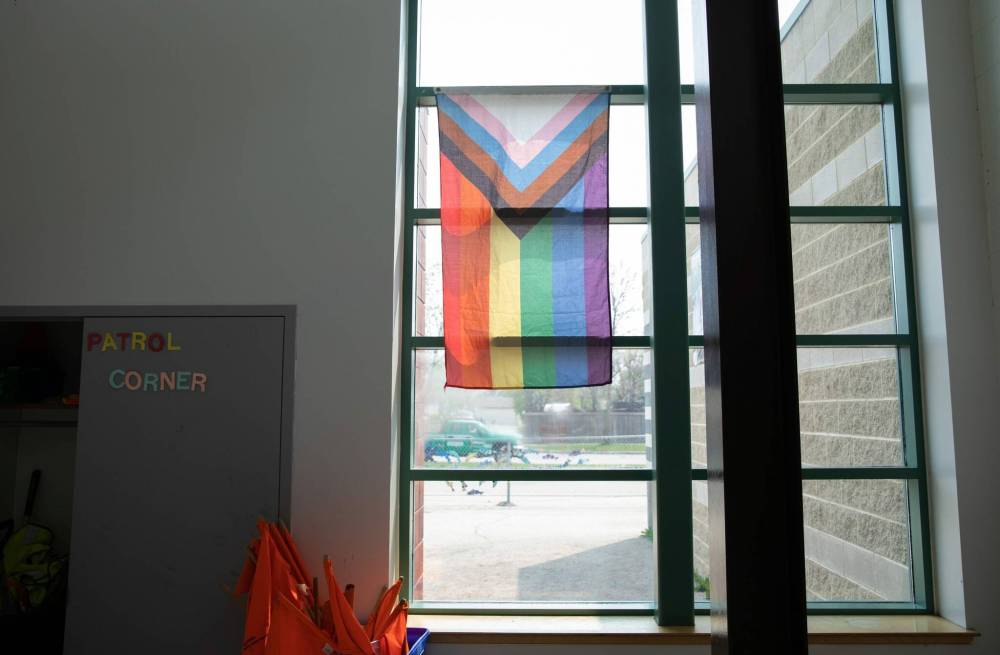
On the surface, parental rights are a concept that appeals to a wide range of guardians who feel disempowered, especially immigrants from conservative societies who are used to having absolute powers over their children until they turn 18, Ahmed said.
The reality is conspiracy groups are leveraging this generic language, as well as widespread uncertainty in the wake of the COVID-19 pandemic, the surge of Trumpism in the post-2016 era and polarizing subjects to further their extremist views, he said.
“They want to create their own network of schooling so they can groom their people,” Ahmed added.
The overarching movement dismisses school division policies and related anti-bullying activities that have long been intact to create safe learning spaces for all students and staff, regardless of sexual orientation and gender identity, or SOGI in shorthand. It also largely dismisses children’s rights.
Hazel Woodrow has been investigating the movement around parental rights, what she calls a “thought-terminating cliché,” in recent months in her role as an education facilitator at the Canadian Anti-Hate Network.
“Parental rights to do what? Parental rights over who? It just feels so true that it resonates with people on a level that doesn’t ask them to do any more unpacking about what parental rights mean,” Woodrow said.
The campaign becomes “quite fragile” when these kinds of queries are raised, she said.
Her research suggests many people attracted to the superficial rhetoric are unaware of the true motives — the promotion of a sexist, authoritarian and nuclear family structure wherein parents have complete control over children — of hardliners who are propelling the crusade by creating content on social media, in pamphlets and holding rallies.
MIKE DEAL / FREE PRESS ‘Parental rights’ protesters and counter-protesters clashed at the Manitoba legislature last autumn.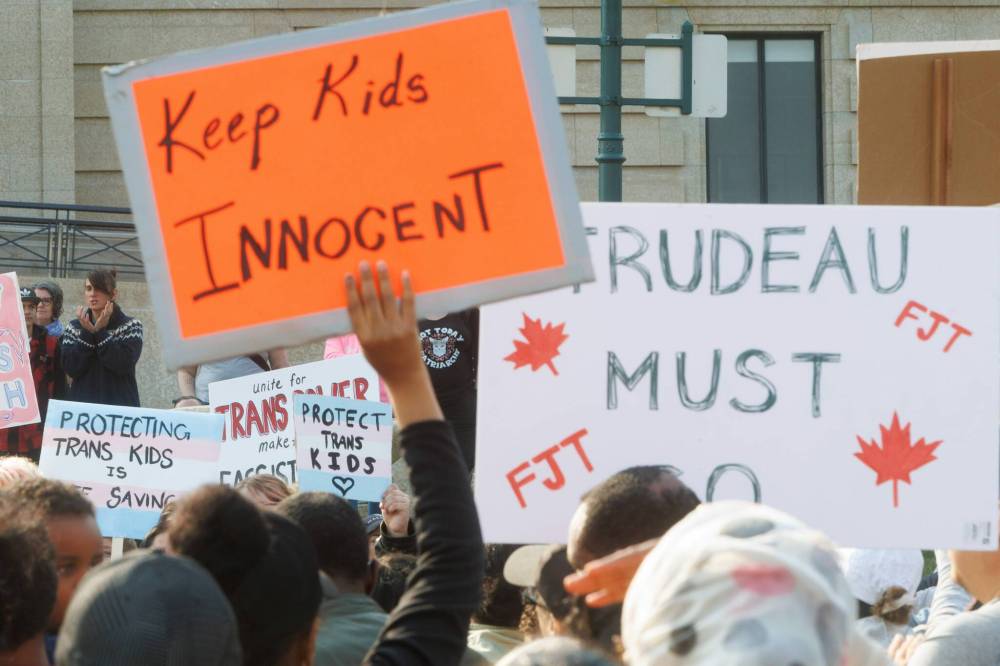
“We can’t disentangle the rise of the so-called parental rights movement from the fact that it is occurring immediately after children return to school after the height of the pandemic and the feelings that people may have about, ‘Is a school building a safe place for my child or not?’” Woodrow said.
“And I don’t think it’s an entirely logical or specific kind of fear; it’s just fear that we have all been baking in for a long time.”
Not unlike anti-lockdown rallies held after all COVID-19 restrictions were lifted, organizers’ messaging has proven they are not all that concerned with literal reality, she said, adding their priorities appear to be movement-building and putting enhanced individual rights above what’s best for society at-large.
Currently, the legal rights of parents are outlined in Section 58 of Manitoba’s Public Schools Act.
Among them, guardians are entitled to be informed regularly about student attendance, behaviour and academic achievement, receive information about school programs, access their child’s pupil file and consult with educators. School board trustees are another avenue for complaints.
The education department requires boards to approve a “parental option” related to sex-ed, allowing families to choose alternative delivery when content is in conflict with their household, religious or cultural values.
A4C’s founder — who has established 110 chapters across Canada, four of which are located in Manitoba (Pembina Valley, Steinbach, Virden and Winnipeg) — declined an interview request, but she agreed to respond to questions via email.
Asked about what parental rights means to local members, Tanya Gaw replied: “What it has always meant. That the parent is 100 per cent in control of raising and educating their children, as is their God-given role, and that the ‘state’ has no power or authority to interfere.”
As far as Gaw is concerned, schools need to “return to” their focus on reading, writing and arithmetic.
The ultra-conservative group’s wide-ranging website condemns all education on SOGI and aims to mobilize Canadians who oppose abortion, child vaccinations and “government overreach,” and those who do not believe in climate change or cannabis legalization.
It also amplifies conspiracy theories, ranging from COVID-19 vaccines containing microchips to the United Nations orchestrating an unclear world-domination scheme.
It’s lunch-time at Dakota Collegiate and teenagers have gathered to vent, cry and hang out with LGBTTQ+ peers and allies without fear or judgment.
Volunteer teacher-supervisors are in charge of snacks and facilitating discussions at the Gender Sexuality Alliance. Today, a bag of Goldfish crackers — rainbow edition, of course — is being passed around.
Meetings always begin with introductions. Each attendee shares their chosen name and preferred pronoun.
As the hour-long session gets underway, members debrief on an uptick in homophobic and transphobic microaggressions among fellow students and an uncomfortable conversation with a parent who visited their booth at the Grade 9 open house.
“The mom was not-so-open to the pronoun pin (station), especially. She was very much of a mentality that there are only two genders: there’s men, and there’s women,” said one student, who relayed her response was explaining that everybody uses pronouns, although some people choose to announce theirs, and acknowledging everyone’s preferences is, at its core, about respect.
The teenager later lamented her frustrations about adults in her life being able to recall the names of their colleagues and their colleagues’ children’s names yet they complain preferred pronouns are too complex to remember.
To these students, members of Gen Z and Alpha — who have grown up in a post-2005 country where same-sex marriage is recognized and LGBTTQ+ rights are enshrined in human rights codes — gender-neutral terms are nothing to fuss over.
The GSA is a judgment-free zone. That’s what draws some members, who have yet to come out of the closet at home, to Dakota’s group.
Parental rights have come up frequently throughout the school year, alongside controversial policy developments across the country, and they’re a subject of discussion on the recent meeting’s agenda.
Manitoba has not joined New Brunswick, Saskatchewan and Alberta and introduced a new policy requiring school staff to inform caregivers if their children want to use a pronoun that does not correspond to the gender they were assigned at birth.
But the Progressive Conservatives’ vague pledge to bolster parental rights during its failed provincial election campaign last fall incited a local debate, and it’s unlikely to quiet anytime soon if interim leader and former education minister Wayne Ewasko’s latest comments are any indication.
During a reporter scrum after question period Tuesday, Ewasko said parents deserve to be in-the-know and suggested there should be parental consent attached to pronoun use similar to field trips.
The former guidance counsellor stopped short of taking a firm policy stance on the divisive topic.
While Manitoba’s new NDP government has shut down the parental rights rhetoric, the divisive issue will all but certainly be part of the next federal election campaign.
MIKE DEAL / FREE PRESS Signs promoting positive, inclusive learning on display at Amber Trails Community School.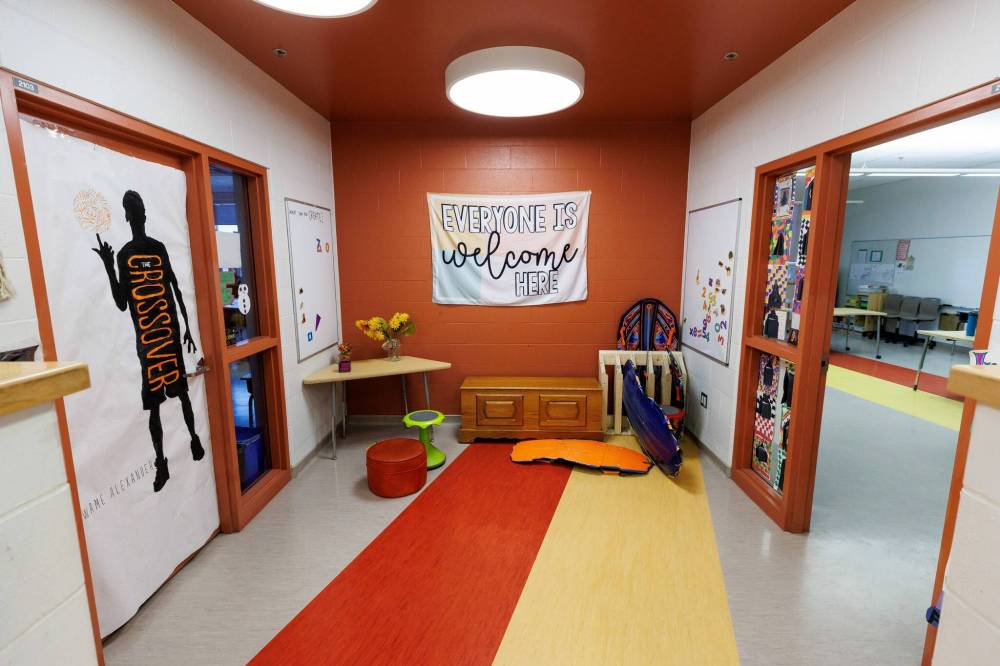
It’s not uncommon for LGBTTQ+ students to test out different pronouns in order to find the best fit and, sometimes, they need time to make sense of their identity before telling adults in their life, said Levi, a Grade 10 student.
Levi identifies as a transgender, bisexual male but it took time to find those words when he realized she/her didn’t feel right in Grade 7.
The 15-year-old considers himself incredibly lucky that his mom is so accepting and his middle school principal immediately sought out support from the Rainbow Resource Centre to train teachers and put up Pride flags.
Not all of his LGBTTQ+ friends have been as fortunate; he said he recently received a series of heartbreaking text messages from a peer who was told by a parent that if their child came out as gay, they would kill themselves.
“If I grew up in a space that wasn’t safe for kids like me, I would just hate the fact that I am who I am and then suffer,” he said.
Levi, who also uses they pronouns, said shielding queer and trans kids from LGBTTQ+ representation and forcefully outing them — and in turn, outcasting them — will not change who they are but it will stop them from loving themselves. “It’s that simple,” he added.
LGBTTQ+ youth, who have been on the margins of society throughout history, are frequent targets of bullying. And as a result, they are far more likely to experience serious mental health issues, self-harm and die by suicide than their peers.
For teacher Russ Ford, the most “disingenuous” element of the ongoing movement to police student identities is that it’s based on the notion parents always know what’s best for their children.
“It’s disingenuous because, clearly, anyone who’s ever had parents — read, everyone — knows that what their parents think is best for them isn’t necessarily what’s actually best for them,” said Ford, who volunteers his time to supervise the GSA club.
The provincial Tories leaned into this rhetoric last fall.
Obby Khan, Manitoba’s first Muslim MLA, was the face of the Tories’ parental rights platform. He appeared on billboard advertisements alongside large text declaring: “PARENTS KNOW BEST.”
It was a typical fall school day, yet roughly 200 students or about 30 per cent of the population at Amber Trails Community School was missing.
“We had no clue what was going on,” said principal Navjeet Kambo, recalling her confusion when class attendance lists started coming into her office the morning of Sept. 20.
At the same time, parental rights proponents were gathering on the grounds of the Manitoba legislature for a mass demonstration entitled “1MillionMarch4Children.” Upwards of 1,500 people, including counter-protesters carrying Pride flags, were clashing over the divisive issue.
MIKE DEAL / FREE PRESS files Hundreds of protesters arrive at the Manitoba Legislative building from The Forks to take part in the Hands Off Our Kids’ national “1 Million March 4 Children” event.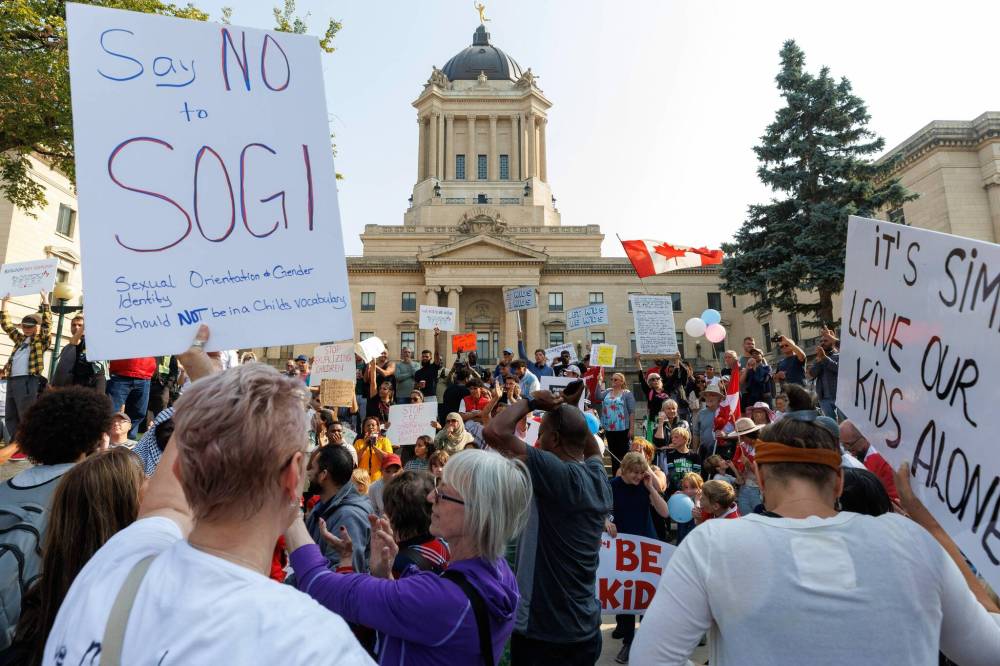
Seven Oaks School Division staff who work with newcomer families would later flag posts in Punjabi, Hindi and Arabic that were on social media promoting the event, misinformation about sex-ed and urging parents to keep their children home.
Senior administration called an emergency meeting at the board office to discuss how Kambo and other principals who recorded abnormal absenteeism that day — in particular, among Muslim and Punjabi families — should respond.
They initially sent notices home to parents saying, “We missed your child today!”
School leaders also invited groups of worried parents into Amber Trails to answer their questions about LGBTTQ+ representation and children’s safety in schools.
During a series of subsequent meetings, some parents revealed they had kept their children home due to a mix of peer pressure and wanting to show solidarity with others in their network who were doing the same. Others had genuine fears about what was going on.
“We are a very inclusive school from Day 1. When we were opened and for many years, we have been doing Pride picnics,” Kambo said. “Nothing changed this year. Nothing was new.”
The conversations that followed were long but necessary in that they built trust and provided immigrant parents with insight into how Canadian public schools operate and their ethos about acceptance of all forms of diversity, the principal said.
Kambo appealed to parents by explaining how, much like it’s important for brown students to see themselves in books, students from nontraditional families should be represented in schools, too.
Ultimately, the sessions were well-received and ended with parents saying they would spread the information with relatives. The principal has not heard about parental rights matters in the school community since.
In the Louis Riel School Division, parental rights organizers and supporters have sustained their advocacy amid a controversy surrounding a now-former school trustee in St. Boniface.
JOHN WOODS / FREE PRESS People gather in support of Francine Champagne, a school trustee who resigned in the wake of posting controversial content.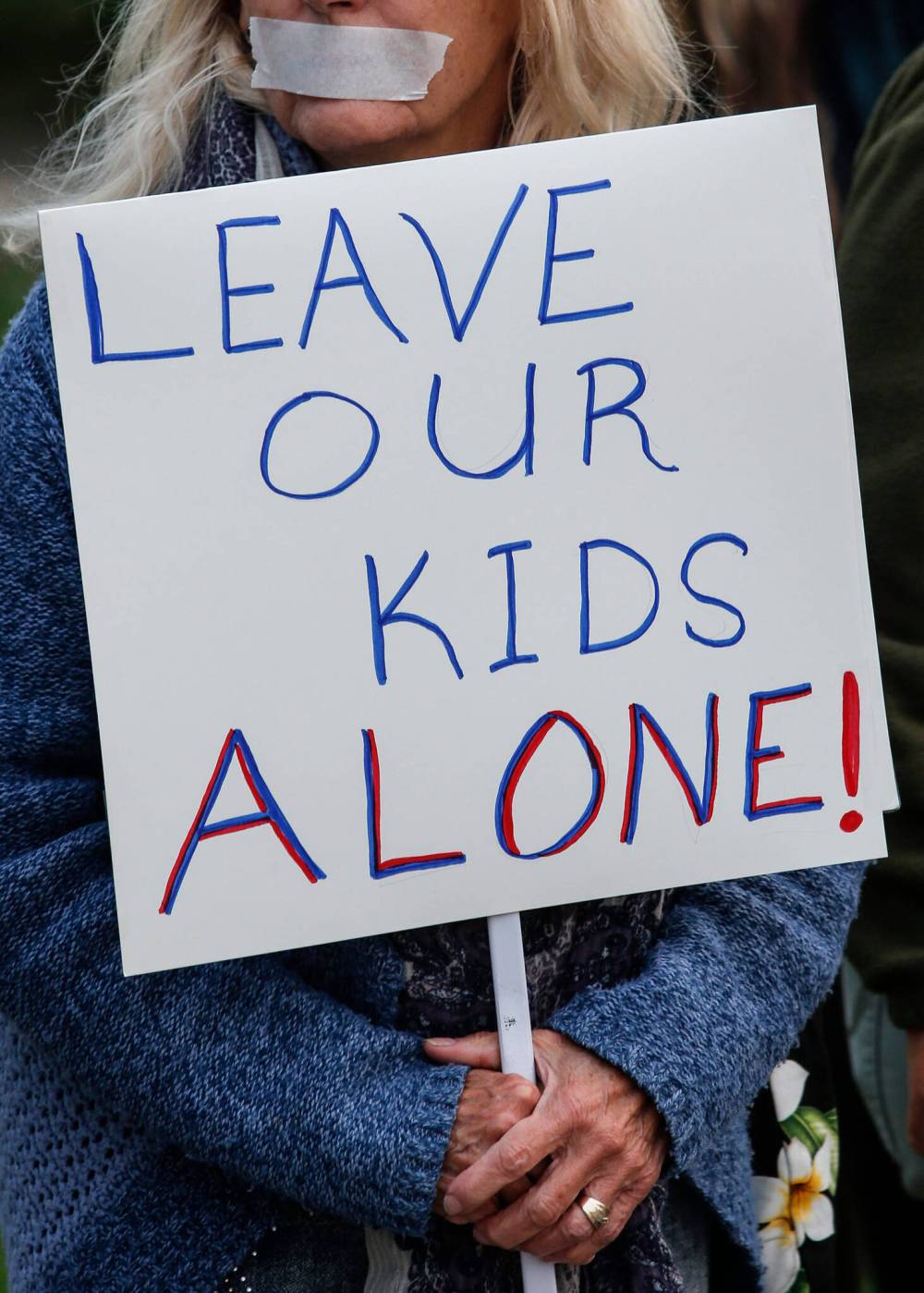
Francine Champagne gained notoriety for making sensationalist claims schools had become indoctrination camps pushing forward an unnamed elite group’s desire to groom children to normalize pedophilia and establish worldwide tyranny.
Champagne stepped down last November after facing repeated penalties for posting far-right content on her personal social media page that was reminiscent of unfounded QAnon theories born in the U.S.
The rookie elected official’s views, which the board deemed to be in conflict with its human diversity policies, resulted in dozens of protesters raising a ruckus at a June board meeting and their subsequent ban from LRSD sites.
Multiple rallies, organized by both her supporters and LGBTTQ+ allies, were held at the start of the school year. Division leaders issued anti-hate statements and adjusted meeting policies to crack down on improper decorum.
“Learning about diversity is not indoctrination. Learning about differences that people experience in their lives is not indoctrination, and there’s no promotion of any agenda,” said Carla MacMillan, a student services teacher in the division.
Since the school year started, the teacher — who began her career in education 26 years ago — has noticed a shift in students’ comfortability with making bold microaggressions and remarks online and in-person on a variety of topics including LGBTTQ+ rights.
She is studying the subject as part of her educational leadership master’s program at Brandon University.
Both at work and in her personal studies, MacMillan is interested in how public education can be used to build understanding and a sense of belonging among youth, and show students it is possible to coexist with different opinions.
Teachers are trained and expected to present information objectively and teach critical-thinking skills so students can sift through information, spot falsehoods and make their own judgments, said Ayodeji Osiname, who trains educators at BU.
At the same time, the assistant professor said school boards have an obligation to balance human rights and ensure their environments are safe for everyone.
Osiname attended a packed evening meeting about book bans in Brandon — viewed by some as the mainstream launch of Manitoba’s parental rights movement — that lasted more than six hours and crept into the early hours of the morning on May 24.
Residents with varying views had an opportunity to speak their minds.
However, one man who showed up in a red Make America Great Again hat and began shouting bigoted things was asked to remove himself, Osiname recalled, citing the event as an example of the difficult challenges trustees face in juggling their responsibilities.
It was a one-off incident that, in hindsight, hinted at things to come.
Five years ago, father Henry Hizon made a presentation to Pembina Trails’ leadership to request the end of sex-ed in elementary schools.
“Hizon wants to know why the LGBTQ views are being taught in the schools,” according to the Sept. 12, 2019 meeting minutes, which indicate he spoke about his Grade 5 son coming to him with a question about information at school that stated “boys can choose to be straight or gay.”
In Grade 5, students are supposed to learn about physical changes associated with puberty and examine social and cultural influences on sexuality and gender roles.
The school board’s response was to reiterate their curricular commitments and inform him that sex-ed is optional.
When reached by phone, one former trustee said recently they found it odd that a parent was requesting the board shield all children from information at a time when they have access to everything via technology.
“The second you deny a child anything, that’s what they want,” said the retired official, who asked not to be named for fear of retribution in their community.
Parents engaged in the rights rhetoric appear to have forgotten they have a lot of power in their house, the ex-trustee said.
ALEX LUPUL / FREE PRESS files A Pride flag waves outside a Winnipeg school.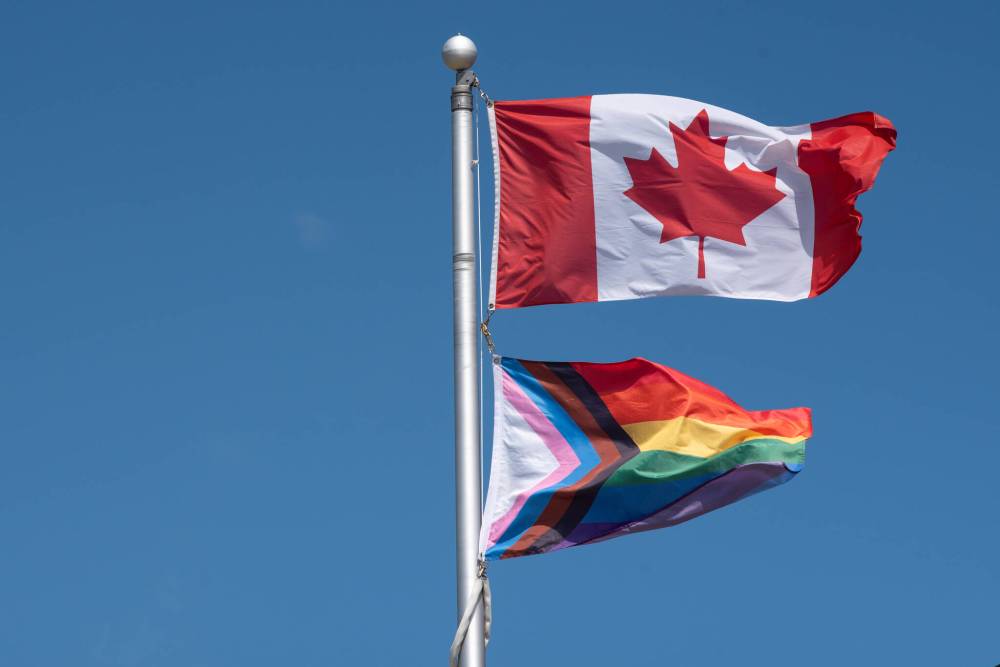
The sensitivity — and the divisiveness — of the subject has many not wanting go on the record.
Attempts to interview a number of former educators, school leaders, parent councils — and even the head of the Canadian Museum for Human Rights — were either ignored or declined.
In a statement, superintendent Boles said she encourages members of the public to review the curriculum, including phys-ed and health lessons, online.
Cameron Hauseman, a father, teacher and assistant professor of education governance at the University of Manitoba, said it is important to acknowledge parents’ emotions typically come from a place of care for their children.
Hauseman said he is optimistic the 2025 launch of an online teacher registry and independent disciplinary tribunal in Manitoba will empower residents, in turn addressing concerns that they are not being heard and things are being hidden from them.
“It will give parents a legitimate avenue where they can report any issues that they think they have with their child’s teacher,” he said, adding residents won’t feel the need to join a movement if they have trust in the K-12 education system and the names of innocent educators will be cleared in the process.
The U of W’s Ahmed said school divisions provincewide need to stop shying away from these real — and in his view, misguided — parent concerns.
Town halls and webinars can counter false rhetoric with research and facts, said the academic who studies extremism and radicalization.
“We need those brave spaces more,” he said.
“If schools do not respond just to minimize the risk of not getting into this polarized discussion, it will be more difficult in the future to deal with it.”
maggie.macintosh@freepress.mb.ca

Maggie Macintosh
Education reporter
Maggie Macintosh reports on education for the Free Press. Originally from Hamilton, Ont., she first reported for the Free Press in 2017. Read more about Maggie.
Funding for the Free Press education reporter comes from the Government of Canada through the Local Journalism Initiative.
Every piece of reporting Maggie produces is reviewed by an editing team before it is posted online or published in print — part of the Free Press‘s tradition, since 1872, of producing reliable independent journalism. Read more about Free Press’s history and mandate, and learn how our newsroom operates.
Our newsroom depends on a growing audience of readers to power our journalism. If you are not a paid reader, please consider becoming a subscriber.
Our newsroom depends on its audience of readers to power our journalism. Thank you for your support.
History
Updated on Friday, March 15, 2024 11:08 AM CDT: Removes photo

















